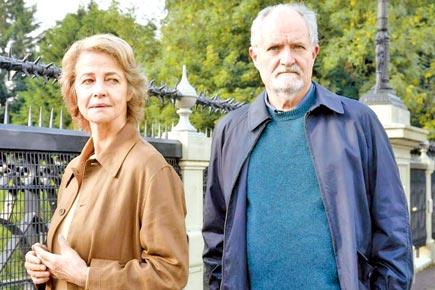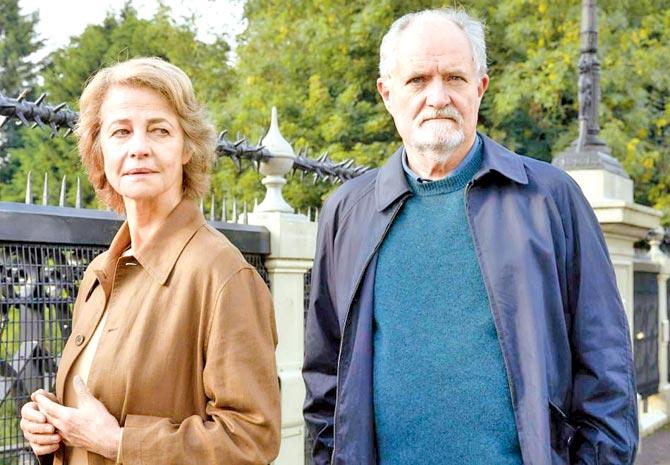Ritesh Batra's The Sense of an Ending is a restrained, elegant, very British reverie on the nature of memory and desire, conveying a great deal in deft, haiku-like strokes

Charlotte Rampling and Jim Broadbent in the film The Sense of an Ending, directed by Ritesh Batra

Charlotte Rampling and Jim Broadbent in the film The Sense of an Ending, directed by Ritesh Batra
 Ritesh Batra's The Sense of an Ending is a restrained, elegant, very British reverie on the nature of memory and desire, conveying a great deal in deft, haiku-like strokes.
Ritesh Batra's The Sense of an Ending is a restrained, elegant, very British reverie on the nature of memory and desire, conveying a great deal in deft, haiku-like strokes.
ADVERTISEMENT
After Mira Nair and Deepa Mehta, Batra is the one that got away in the new generation, making high profile, acclaimed films worldwide. After his superb short Cafe Regular, Cairo, his Dabba (The Lunchbox) opened at Cannes and was sold in 50 territories. He has followed up with this British film starring Oscar-winner Jim Broadbent and Oscar-nominated Charlotte Rampling, and is wrapping up Netflix's Our Souls at Night, starring American legends Jane Fonda and Robert Redford. It is his excellent chameleon-like skills and empathy that allow him to make 'insider films' in different cultures.
The Sense of an Ending, adapted from Julian Barnes' Booker prize-winning novel of the same name, is a reflection on the fickle nature of memory. Tony Webster (Jim Broadbent) leads a lonely, retired life, occasionally catching up with his ex-wife Margaret (Harriet Walter, superb) and daughter Susie (Michelle Dockery).
He is mostly self-absorbed, seeing himself as a victim, unaware that those around him may be struggling with worse. An unexpected legacy reconnects him with Veronica, his first girlfriend in college (Charlotte Rampling) and her recently deceased mother Sarah (Emily Mortimer). Tony had cursed Veronica when she went off with his best friend Adrian, but the truth is even more shocking. The film explores how memory has a malleable, kind of PR-ish quality. Waltz with Bashir had similarly explored how our memory not only erases unhappy events, but even invents fake events, to make us look better.
Batra gives you a keen sense of how, in later years, an early memory, a first love, can turn out to be a defining relationship, as if the intervening marriage, went by in a blur. In this, it has much in common with Andrew Haigh's magnificent 45 Years, similarly about a marriage/ relationship unravelling because of a secret first love, also starring Rampling.
There's a marvellous scene of time travel, when Webster revisits the past, as an ageing, balding man, attending a college party in his youth and meeting his young, future girlfriend for the first time. The editing goes back and forth with too many flashbacks. Scattered with red herrings, the screenplay is a tagliatelle of relationships. Tony thought Veronica dumped him for his best friend Adrian. But, you're not sure.
Years later, you think Veronica is still in love with Adrian. But then, you remember, didn't Adrian commit suicide? You see that Veronica's mother Sarah has the hots for Tony. But, it turns out she was having an affair with someone else. The film only discreetly hints at scandal: that mother and daughter may have had affairs with the same man. Batra consciously refuses to tie up loose ends into a satisfying climax, so we are left with only a sense of an ending. The performances are first-rate, especially Jim Broadbent, Charlotte Rampling and Harriet Walter. The cinematography lushly evokes memories of another time.
Like Webster, the film makes us reflect on whether we really matter in the larger scheme of things. His ex-wife and ex-girlfriend are withering with him, and don't expect any better. None of the women seem to need, or have, men as partners now — not his ex-wife, not his ex-girlfriend, not even his pregnant daughter. Perhaps the most devastating suggestion of the film, is that men are increasingly redundant in women's lives.
It is remarkable how Batra has gone from his first local Mumbai feature The Lunchbox to this quintessentially British feature in his very next. Has he fulfilled expectations after The Lunchbox? A resounding yes.
Meenakshi Shedde is South Asia Consultant to the Berlin Film Festival, award-winning critic, curator to festivals worldwide and journalist. Reach her at meenakshishedde@gmail.com
 Subscribe today by clicking the link and stay updated with the latest news!" Click here!
Subscribe today by clicking the link and stay updated with the latest news!" Click here!







